You will not escape the climate crisis
Posted on 7 October 2024 by Guest Author
This is a re-post from the Climate Brink by Andrew Dessler
On Bluesky, it was pointed out that Asheville, NC was recently listed as a place to go to avoid the climate crisis.
Mother Nature sent a “letter to the editor” indicating that she didn’t agree:
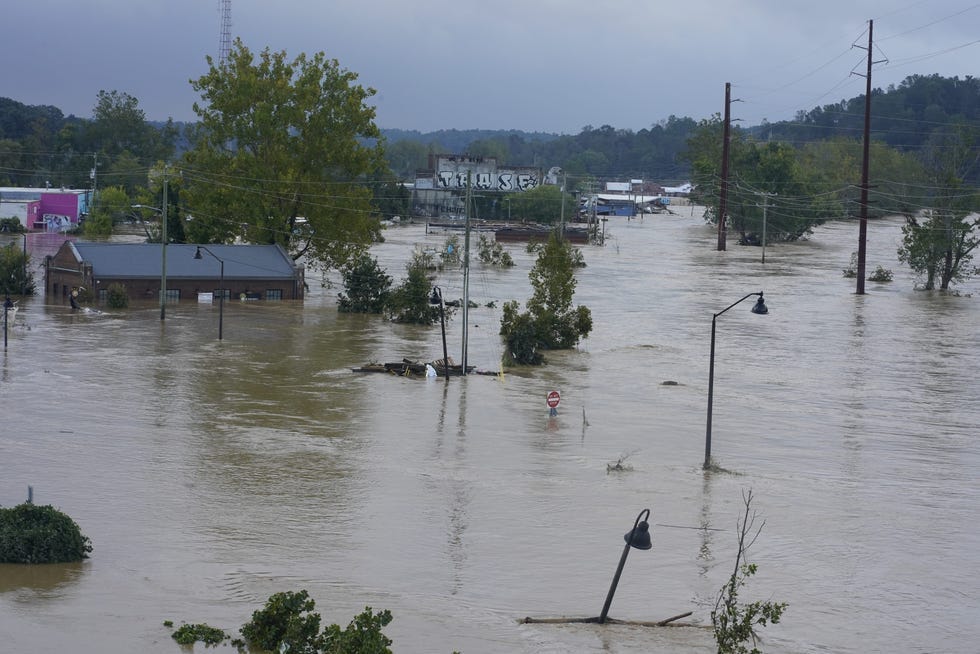
Helene’s climate link
While climate change does not cause hurricanes, we are certain it makes them more destructive. Humans have increased sea level, leading to more destructive storm surge, and a warmer atmosphere produces more rain.
Many people don’t understand how this will affect them. They think it’s a long-term problem where small impacts accumulate over decades, eventually leading to significant consequences far in the future.
In reality, though, these increases in storm surge and rainfall push our physical environment beyond thresholds that infrastructure was designed to handle.
As a result, the impacts of climate change are non-linear: they are zero until you cross the threshold and then, suddenly, you are wiped out. This leads to headlines like this:
Read more about the non-linearity of climate impacts here. The upshot is that, with climate change, you’re fine until you’re not.
Indirect effects
Even if you were not directly impacted by Helene, you may still be affected by the downstream consequences.
For example, I’ve written extensively about homeowner’s insurance, and how it’s the canary in the climate impact coal mine. We have systematically underpriced climate risk in this country and Helene will be another step down the road to a national reckoning.
At best, insurance rates will go up. At worst, insurers will pull out of markets across the southeast U.S. In the absolute worst case, if the insurance industry can’t pay all of the claims, then society (e.g., you and me) will be on the hook to bail it out.
Here’s an impact I didn’t know about until a few days ago: Helene’s impact on the production of computer chips:
From Material World1:
“Here's something scary,” says one veteran of the sector. “If you flew over the two mines in Spruce Pine with a crop duster loaded with a very particular powder, you could end the world's production of semiconductors and solar panels within six months.” No high-purity quartz means no Czochralski crucibles, which means no monocrystalline silicon wafers, which means, well, the end of computer chip manufacture as we know it.
We would adapt; find a new process or an alternative substance. But it would be a grisly few years. Perhaps this is why those who work in high-purity quartz are so jumpy. Perhaps that's why the man who passed on that scary thought exercise insisted that I didn't print the type of powder that would play such havoc with the processing of those mines in North Carolina, which quietly serve this tiny but pivotal role in the functioning of the modern world.
I don’t know if this facility was damaged by Helene’s flooding, but let’s hope not.
We live in a globally integrated world full of potential single-point failures. Many of them you’ve never even heard of. Helene shows how climate change is threatening them — and, by extension, you.
Irony alert:
The forecasters nailed it
Please spare a moment to appreciate the forecasters at the National Weather Service. They absolutely nailed the Helene forecast.
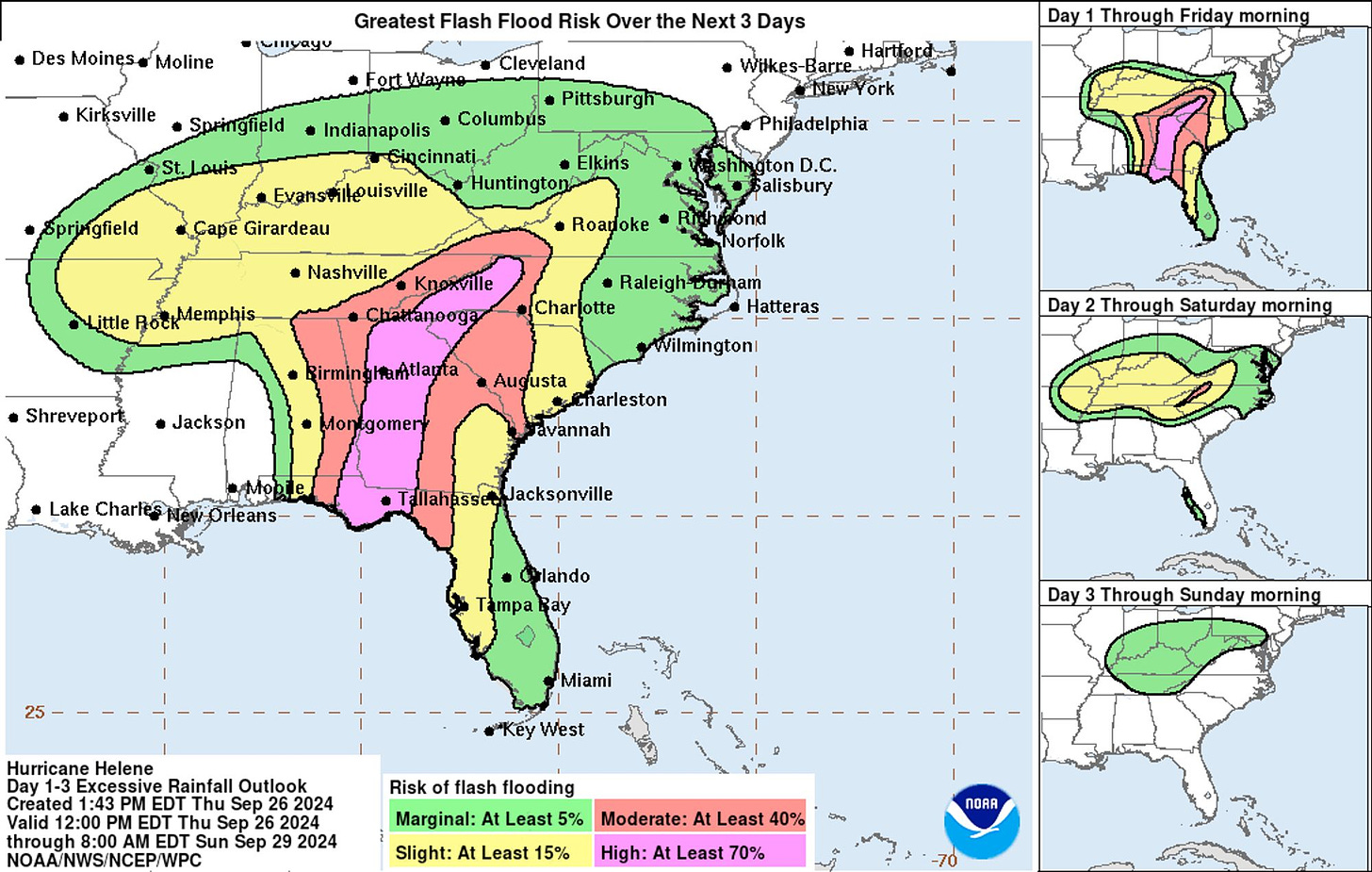
Related reading
Hamilton Nolan’s substack has a lot of great things about insurance. For example, read this and then subscribe.
Susan Crawford’s Moving Day substack is one of the best ones on the looming insurance crisis. If you want to see what’s coming in the insurance space, subscribe to it.
Read more here about Spruce Pine and the potential silicon crisis.
In Rolling Stone, Jeff Goodell writes about the Age of Climate Migration and also says Asheville is a good place to move to avoid climate impacts.































 Arguments
Arguments





















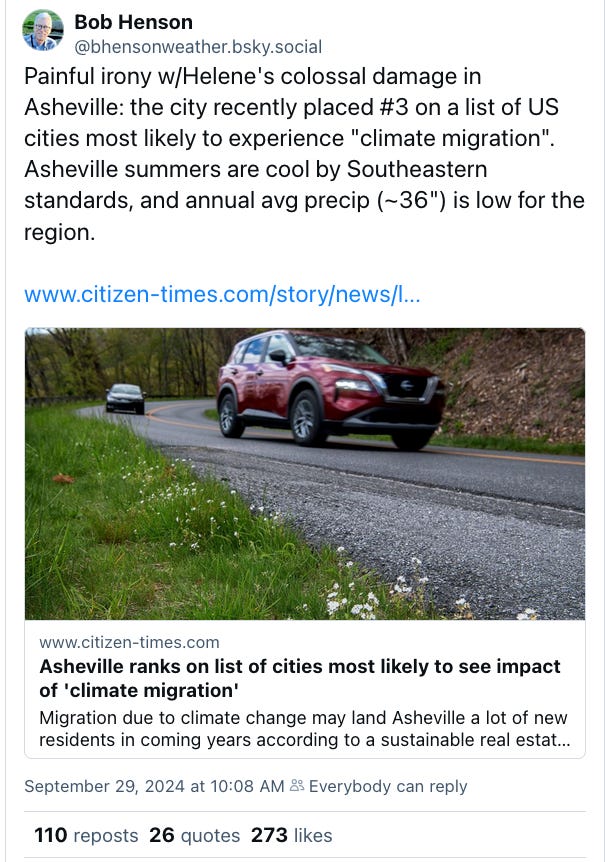

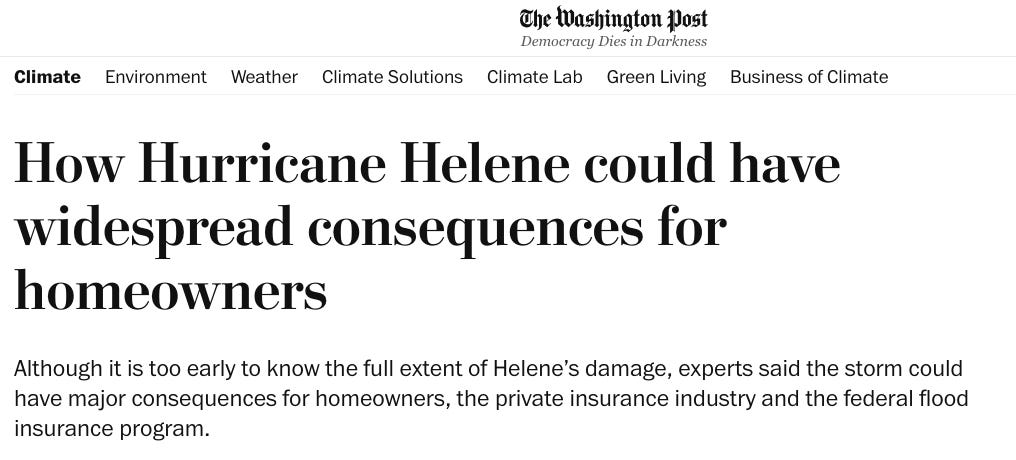
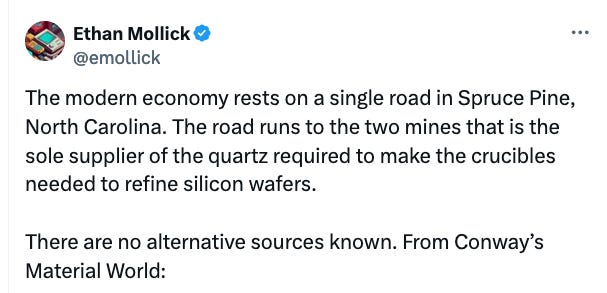










Of course no life will escape the increasing effects from climate change and we know dealing with its consequences will vary from annoyance to survivability depending on many factors - especially your bank account.
Further checking out Mr Dressler's re-post and his informative articles, i could particulary relate to this comment ...
John Hardman
John’s Substack
Aug 4, 2023
Liked by Andrew Dessler
"I am reminded of the silly Monty Python skit where the knight confronts the king and is progressively dismembered while staying defiant. “It is but a flesh wound!” he bellows as his dismembered arm lies at his feet. Denial is not bound by sanity.
Change happens using the same path as the grief cycle: denial, bargaining, anger, surrender, and acceptance. Logically we should be feeling the pain of climate change wounds and the financial pinch of accruing costs, but we are looping in a cycle of denial, bargaining, and anger. The question becomes what level of pain will knock us (and the rest of the natural world) to our knees and accept responsibility for our fate?
Looping in the first three stages of change allows us to play the victim and shift the blame to others which is easy and addictive. But, inevitably a reckoning happens where the wound is felt deeply and personally. The pain sears through the fog of illusion bringing us out of the clouds and back into our humanity. I shudder to think what must happen to bring us down to earth but the power of denial is formidable and we now have a lot of distractions from our pain. Monty Python showed us the bounds of our absurdity. We may just exceed them."
The distractions are increasing and I have always believed when we are faced with a common "enemy", the whole tribe would unite-put our differences to one side and work together- people, how bad does it have to get before this happens? Are we just too de-sensitized to human suffering now?
I suspect the world will only take climate change seriously when a heatwave kills something way out of the boundaries of normality maybe 300,000. It's like covid when it was a small thing in China nobody was too worried but when large numbers started dying in Italy the world woke up. But I could be wrong so it's still Important to promote mitigation policies.
Yes, mitigation policies are 100% better than forced adaptation measures and surely educated people can elect educated leaders-( I wish).
prove we are smart,
I am quite confident that the most successful path to developing lasting improvements for the future of humanity would be 'everyone pursuing increased awareness and improved understanding of how to be less harmful and more helpful to others'.
History, recent and the distant past, is full of evidence of sub-sets of the totality of humanity (the total being all people living today and into the future) benefiting by getting away with acting in ways that are detrimental to Others, especially being detrimental to 'future Others'.
And even when the harm done happens to people they know the 'sub-set benefiting from causing harm will tend to try to find ways to excuse the harm done by their unsustainable unjustifiable pursuits of personal benefit. Their excuses will include:
So, I am also quite confident that an 'improving lasting future for humanity' requires the powerful regions on the planet ensure that their leadership is always governing based on learning to be less harmful and more helpful to others (especially the future others).
So, effectively making those who try to pursue popularity through misinformation and disinformation 'the losers' is essential to the future of humanity.
So, there will always be a tribal conflict between the harmful misleaders and those who promote learning to be less harmful and more helpful to Others.
The requirement is for the misleaders to not be significantly influential - everywhere on every issue. That appears to be very difficult to achieve.
I hope humanity has a lasting improving future. But there is significant reason to doubt that it will.